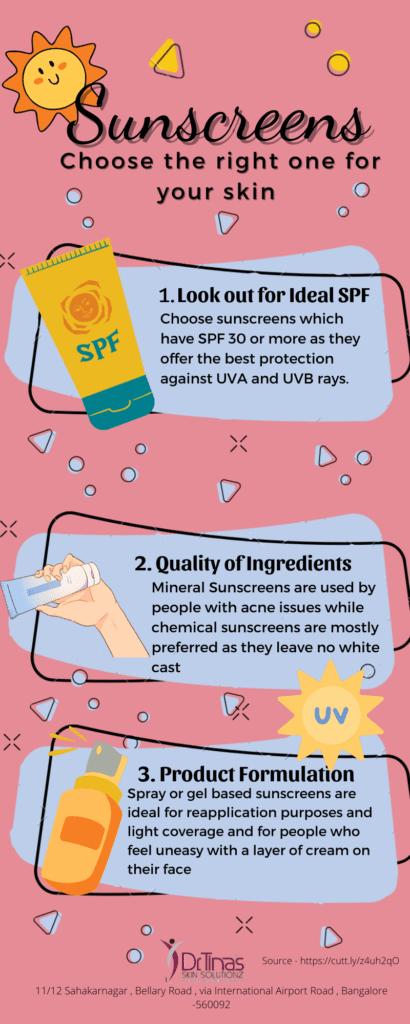How to Choose the Right Sunscreen for Your Skin Care – Tips From Top Dermatologist

Rashmi wants to buy a sunscreen that suits her skin and does not make her sweaty, look chalky and unrealistically white. But she’s clueless where to start from.
Almost all women have a dilemma in choosing the right sunscreen that suits their skin perfectly. Here’s a guide on how to choose the perfect sunscreen for your skin.
Know Your Skin Type
As any specialist in pigmentation treatment in Bangalore (or any other place, for that matter) would confirm, the choice of sunscreen should always depend on your skin type. Knowing the skin type is essential, given the number of options available in the market. Typically, skin can be categorised into three broad categories – oily, dry and combination. Oily skin is characterised by grease and large pores, dry skin is accompanied by flaky skin and combination skin is typically oily on the forehead and nose area, and dry elsewhere.
For dry skin, sunscreens with hydrating ingredients, ceramides and hyaluronic acid are recommended. For oily skins, water-based sunscreens are generally preferred. If you have combination skin , a mix-and-match of hydrating yet lightweight sunscreens are suitable. Of course, if you have normal skin, any standard sunscreen can be used.
Know The Spectrum
Sunscreens are available (i.e., are formulated) according to different spectrum ranges. If you have sensitive skin, choosing a broad-spectrum sunscreen is ideal. What does ‘broad-spectrum’ mean? It means that your skin is protected from a broad range of ultraviolet rays from the sun, particularly UVA and UVB. Broad spectrum sunscreens are ideal for almost all skin types – given that they offer protection from premature skin ageing and skin cancer. Look for the terms ‘FDA approved broad-spectrum’ on the packaging.
Identify The Ideal SPF
If you did not know about what the three letters ‘SPF’ on products meant, let’s help you out. SPF stands for Sun P F – which means, it grades the level of protection the product offers from sun damage on your skin. Earlier, SPF was considered ideal for providing enough coverage. Today, for any skin type – a sunscreen with SPF 30 and above offers the best protection. How do they work? SPF 30 approximately allows 1/30th of the sun’s rays, while SPF 35 allows 1 out of 35. The calculation progresses accordingly.
The Type Of Product Formulation
Ever wondered why people prefer sunscreen sprays on beaches? It’s because of the ease of application as well as the wear(feel). The type of product you choose also depends on your preference, as well as skin type. Do you feel uncomfortable if there’s a layer of cream on your face? Then, for you, a spray or gel-based sunscreen is ideal. Spray sunscreens are also ideal for reapplication purposes and light coverage. Of course, it is always advisable to consult a reliable skin doctor in Bangalore before applying any sunscreen product – particularly if you are not sure about its suitability.
The Resistance To Water
Like several other cosmetic products in the market, sunscreens are formulated in water-resistant and non-water-resistant varieties. Water-resistant sunscreens do not only mean they are suitable for times when you go to the beach or go swimming. They are also ideal for you, if you have sensitive or combination skin. That means, you get the maximum protection even when you sweat. However, remember that sunscreens are not ‘waterproof’, and hence, reapplication is recommended.
The Quality Of Ingredients
Did you know that, depending on the ingredients, sunscreens can be categorised into two types – physical and chemical?
Physical or mineral sunscreens sit on the skin and create a barrier from the sun’s rays. Most mineral sunscreens have zinc oxide and titanium oxide. Such sunscreens are often recommended to people with skin issues like acne.
Chemical sunscreens typically have ingredients such as oxybenzone, avobenzone and others. These sunscreens have active ingredients which absorb the UV rays of the sun. Chemical sunscreens are preferred by many, because they do not leave a white cast on the skin like their mineral counterparts.
Sunscreen For Winters?
There is a common misconception that sunscreens are a summer-only thing. As a result, many people stop applying their regular sunscreens during the cooler months – which ultimately proves detrimental to their skin. Experts on pigmentation treatment in Bangalore opine that the regular sunscreen-application regime should be continued in winter (modifications, if any, should depend on the intensity of sun rays one is exposed to). To keep your skin properly protected – sunscreen is your friend, right through the year.
Are you aware that sunscreens can be applied indoors as well? Mineral-based sunscreens are ideal for wearing, even when you are at home. Based on your skin tone, you can go for suitable chemical sunscreen options too.
Skin doctors in Bangalore recommend making sunscreen a part of your regular skin care regime. It is recommended to consult a dermatologist to best identify your skin type and the ideal sunscreen accordingly.


Dr.Tina Ramachander is one of the best dermatologist in Bangalore and Medical Director at Dr.Tina’s Skin Solutionz, a skin care clinic in Bangalore. She completed her master’s in dermatology from the well acclaimed JJM Medical college in Karnataka and is now a practicising dermatosurgeon and Medical Cosmetologist in Bangalore.

